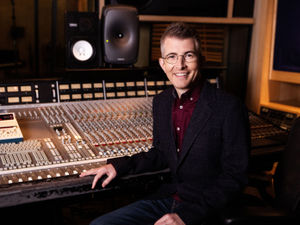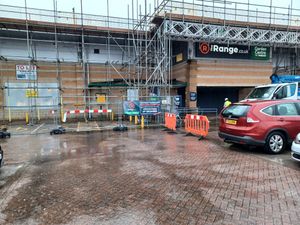How tinnitus made Gareth Malone ‘panic’ over his hearing
When Gareth Malone started hearing ringing sounds after recovering from a sinus infection, it took him a while to realise it was coming from inside his ear.

“There was a ringing in my right ear, really quiet and I didn’t really notice at first. Then I kept thinking, ‘I’m sure there’s a fridge buzzing or something’, just a very high-pitched squeak,” recalls the TV choirmaster, 46, who has three children with wife Becky. “Eventually, I turned all the electricals off in the house and thought, ‘Ah ok, it’s inside my ear’.”
Tinnitus – when you hear sounds such as buzzing, ringing and hissing, which have no external source – is actually quite common. About 30% of people will experience it at some point, according to the British Tinnitus Association.
It’s often unclear why it affects some people more than others, although it’s associated with a number of causes, including hearing loss, ear infections, ear wax build-up and stress, as well as exposure to loud noises (people who work in noisy environments can be more at risk). And although it’s generally rare for tinnitus to be linked with serious underlying issues, as Malone notes, it “can sometimes be the first sign of something sinister”.
For the London-born TV personality, who has been helping people hone their singing voices on shows such as The Choir since the mid-Noughties, his hearing is arguably his most essential tool, and at the heart of his musical passions and identity (he also writes music and plays piano). So, as soon as he realised he had tinnitus, he went to see his doctor. “I found myself having an MRI scan and seeing a consultant, really quite quickly – they were brilliant. And I had all the hearing tests done,” he recalls.
Thankfully, nothing sinister was found. “And there was nothing too wrong with my hearing, but just this one frequency that is damaged, and that’s why I’d got the ringing. The consultant didn’t know whether this was from having my mobile phone too loud, my Walkman when I was younger, or whether it was the sinus infection – who knows?”
Malone has now teamed up with Specsavers, highlighting the importance of taking care of our hearing. The high-street chain offers a range of hearing services, including hearing tests, ear wax removal and hearing aids, alongside general advice.
Even if there’s nothing medically serious going on, tinnitus can have a significant impact. Often, it’s something that comes and goes and doesn’t cause too much trouble. But particularly when it’s persistent, it can be very distressing, and affect things like quality of life and sleep.
There are things which can help a great deal though, including counselling and cognitive-behaviour therapy (CBT), relaxation techniques, and tactics such as white noise or bedtime podcasts, to help you drift off to sleep.
For Malone, although things have remained the same ever since, he feels lucky it didn’t “impede my work or my life”. He says: “I’m really lucky. I’ve got other friends, who are musicians, and have damaged their hearing and are much worse with it and have multiple [tinnitus] sounds – like a swishing sound in one ear and a whistle in the other one all the same time – and that can be very distressing and difficult. It’s there right now when I think about it, but most of the time, my brain just blocks it out. It took a while, but I got used to it.”
However, he admits: “I did panic at first and think, ‘Is this the start of something?’ And there was a period where I felt really angry about it.”
After all, he’d always been “pretty careful about my hearing” – but Malone acknowledges many of us aren’t really aware of the risks of long-term hearing damage through exposure to loud noise, or think these things will never happen to us.
“You hear a lot of people going, ‘Oh my ears were ringing when I left the nightclub’, but then think nothing of it and it goes away – but of course, that’s a sign you’re damaging your hearing.”
For people whose lives and careers heavily revolve around music, hearing damage is obviously a huge deal. But it’s a huge deal in countless other ways too, for all of us.
“Tinnitus and hearing loss can have a massive impact on your mental and emotional health,” says Malone. “And the connection we get with people through music – I think we’ve really seen that more than ever through the pandemic – that’s one of the things a lot of people have really missed, being at a gig, a festival or concert, just listening to music with other people, or being able to sing a song at the same time.”
Hearing also plays a core part in how we communicate, and that all-important sense of community and connection. “To be really clear – we’re talking about hearing loss here. There is a whole community of deaf people who function extremely successfully and have their own culture. But it’s a very different matter to have it happen to you later and be suddenly cut off from people.
“I think we have a sort of instinct for being part of a pack. If you look at gorillas in their societies, they all stick together and pick food off one another and what have you. We are mammals, we want the close company of other people and to feel like we’re part of something bigger than just ourselves,” Malone reflects.
“So yes, it’s really important to be able to hear people, to be able to talk to them.”




